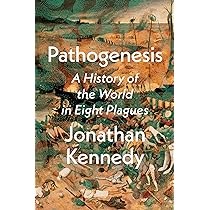Pathogenesis A History of the World in Eight Plagues
Jonathan Kennedy
Published by Signal, 294 pages
Napoleon, Marx, Hitler, Jesus, Muhammad and other major figures like these determined the course of human history, right?
On the contrary, history is shaped by Yersinia pestis, Variola major or V. minor, the four species of Plasmodium and many others. These, according to Kennedy, are the real movers and shakers of our trajectory through the millennia…
I rather doubt that microbes had anything to do with Das Kapital, the Bible, the Qur’an, the invention of the wheel, the printing press or nuclear fission, but whatever the case may be, Kennedy has certainly put a very important player on the stage, one worthy of close scrutiny.
Not only have pathogens caused a number of epidemics but they have also played a significant role in human evolution, therefore the epigraph (by the famous biologist EO Wilson) at the beginning of the first chapter is very appropriate: “History makes no sense without prehistory, and prehistory makes no sense without biology.”
More than just evolution is at play here though: germs have to a significant extent shaped our surroundings - we know that in the distant past other human species populated parts of the earth, such as Neanderthals and Denisovans, but they have all disappeared. Was Homo sapiens responsible for this? Our forebears moved out of Africa approximately 40 000 – 50 000 years ago, and the other human species subsequently vanished. Did H sapiens kill them? Were our ancestors responsible for the first genocide?
No, Kennedy says, the new arrivals most likely carried germs to which they were already immune, unlike their new contacts. An attractive hypothesis for which Kennedy offers no empirical proof, although it does lead to an interesting and worthwhile discussion of symbolic behaviour in H. sapiens and H. neanderthalensis.
There are other more or less unsubstantiated claims, some plausible, others less so, for example that Christianity’s promise of a pleasant afterlife (unlike that of paganism) caused conversions to skyrocket. If he is correct then infectious diseases played an important role in the decline of polytheism and the growth of monotheism, but again, no empirical proof is offered and he does not seem to have considered that Constantine’s conversion may have been a more likely cause.
It is also rather peculiar that he so naively accepts China’s Covid claims, and ascribing all the ills of modern society to slavery is beginning to get rather tedious.
Still, these are minor quibbles about a fascinating book which throws a new light on many aspects of history and the author interweaves major military, socio-political and economic events – upheavals in fact - into a grand and absorbing narrative.
A few examples should suffice, eg that the indigenous inhabitants of the Americas were defenceless against the diseases imported to that continent by explorers from Europe, leaving the country wide open for conquest. The situation in Africa differed, however – malaria, yellow fever and other diseases decimated the first Europeans who set foot into the interior, whereas the indigenous populations had acquired at least some immunity.
Haiti rebels gained independence from France by cleverly using mosquitos as a weapon – waging a guerrilla war in such a manner that the French troops were decimated by yellow fever, to which they were immune.
The horrors of the slave trade are discussed in some detail, boosted as it was by the fact that Africans, immune to malaria and yellow fever, were less likely to die of these diseases and slavers therefore preferred them in this awful trade.
Most American slaves were of African descent, Kennedy postulates that this gave rise to racism, which, as far as white on black racism is concerned, may well be correct, but it does not explain the origins of racism in Africa, nor does he mention that African rulers happily sold their own subjects to white traders.
Kennedy is a sociologist and, not surprisingly, sometimes carried away by a temptation to describe the changing histories of societies through this lens, which is by itself interesting, although the effects of the various plagues are sometimes overshadowed and little is written about the actual natural history of the various diseases themselves.
I don’t think that it matters much. The book is a very interesting take on an aspect of history which has received scant attention in the popular press until now and I think that it should be recommended reading for anyone with an interest in the byways of history.
The views and opinions expressed in this article are those of the author, and do not necessarily reflect the position of this publication.

.png;w=120;h=80;mode=crop)


